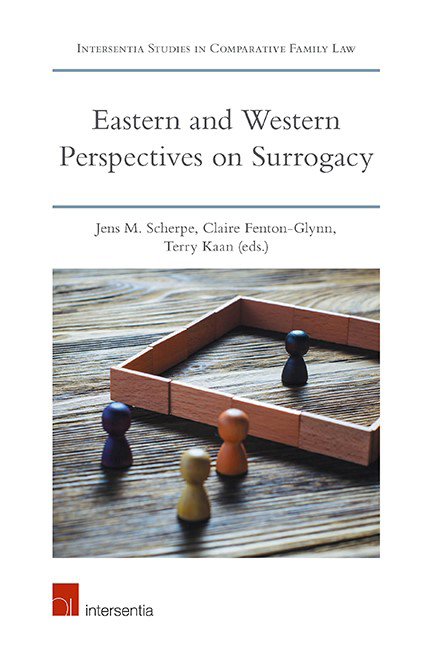Book contents
- Frontmatter
- Preface and Acknowledgements
- Contents
- List of Contributors
- Introduction
- Questionnaire
- PART I WESTERN PERSPECTIVES
- THE PROHIBITIVE APPROACH
- France
- Germany
- Germany: A Judicial Perspective
- Spain
- THE TOLERANT APPROACH
- THE REGULATORY APPROACH
- THE FREE MARKET APPROACH
- THE INFLUENCE OF INTERNATIONAL COURTS
- PART II EASTERN PERSPECTIVES
- THE PROHIBITIVE APPROACH
- A TOLERANT APPROACH?
- REGULATION THROUGH PROFESSIONAL MEDICAL BODIES
- FROM FREE MARKET TO REGULATION
- PART III COMPARATIVE PERSPECTIVES ON SURROGACY
- Index
- About the Editors
Germany: A Judicial Perspective
from THE PROHIBITIVE APPROACH
Published online by Cambridge University Press: 26 June 2019
- Frontmatter
- Preface and Acknowledgements
- Contents
- List of Contributors
- Introduction
- Questionnaire
- PART I WESTERN PERSPECTIVES
- THE PROHIBITIVE APPROACH
- France
- Germany
- Germany: A Judicial Perspective
- Spain
- THE TOLERANT APPROACH
- THE REGULATORY APPROACH
- THE FREE MARKET APPROACH
- THE INFLUENCE OF INTERNATIONAL COURTS
- PART II EASTERN PERSPECTIVES
- THE PROHIBITIVE APPROACH
- A TOLERANT APPROACH?
- REGULATION THROUGH PROFESSIONAL MEDICAL BODIES
- FROM FREE MARKET TO REGULATION
- PART III COMPARATIVE PERSPECTIVES ON SURROGACY
- Index
- About the Editors
Summary
The German legislature first addressed surrogate motherhood at the end of the 1980s. It rejected it then and has continued to do so, a position clearly expressed in the laws surrounding the recognition of parenthood. The German government seeks to maintain this dismissive position in the future as well.
Regardless of this dismissal, there is a need for reproduction by way of surrogacy. For heterosexual (married) couples it is needed to bridge the problem of female infertility, and for male homosexual couples it is needed to fulfil their desire to have children. As surrogacy is forbidden in Germany, these couples turn to other more liberal countries where it is permitted, and where there are agencies that assist couples in finding women who agree to give birth to a child for a fee. However, when the couples then desire to return to Germany with the child and start a family, this leads to a variety of legal problems. It is in this context that the Federal Court of Justice issued its landmark decision on 10 December 2014. In the decision, the Federal Court of Justice developed standards for the recognition of foreign judgments, including the legality of parenthood derived through foreign surrogacy, and how this relates to German public policy. Other significant questions, however, remain unanswered.
GERMAN MEDICAL LAW, ADOPTION LAW AND LAW CONCERNING PARENTAGE
In Germany surrogate motherhood is expressly prohibited by statute. The physician who performs artificial insemination on a surrogate mother or who transfers an embryo to her is criminally liable, as is an agent who procures a woman for this purpose. If a surrogacy nevertheless takes place, however, the surrogate mother is the sole legal mother of the child.
MEDICAL LAW AND ADOPTION LAW
Criminal law provisions seek to discourage surrogate motherhood in a variety of ways. Pursuant to s. 1(1) no. 7 of the Act on the Protection of Embryos (Embryonenschutzgesetz ; ‘ESchG’), a person is liable if they artificially inseminate, or transfer an embryo to, a woman who is planning to give her child to a third party after birth (surrogate mother). Pursuant to s. 1(3) no. 2 of the Act on the Protection of Embryos, however, neither the surrogate mother nor the person who plans to raise the child is subject to criminal liability.
- Type
- Chapter
- Information
- Eastern and Western Perspectives on Surrogacy , pp. 49 - 58Publisher: IntersentiaPrint publication year: 2019

